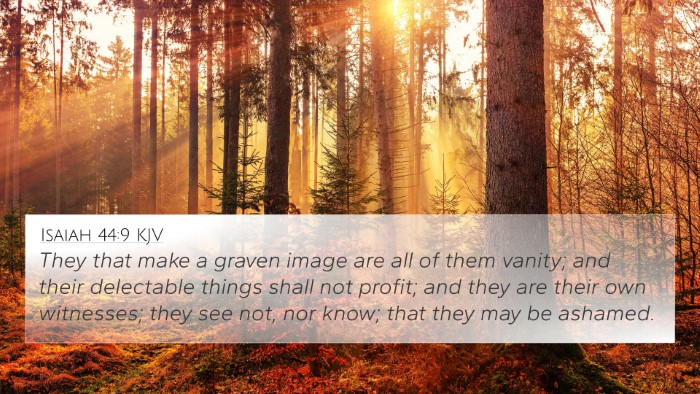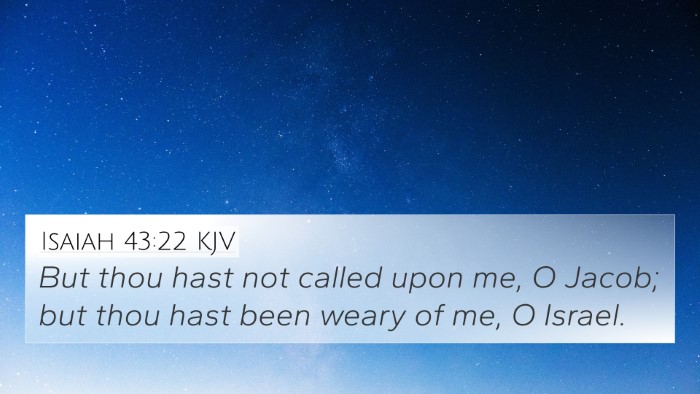Understanding Jeremiah 2:5
Verse: “Thus saith the Lord, What iniquity have your fathers found in me, that they are gone far from me, and have walked after vanity, and are become vain?” (Jeremiah 2:5)
This verse presents a profound inquiry from God through the prophet Jeremiah, addressing the spiritual state of Israel. It emphasizes a lament over the people's abandonment of their divine relationship and the futile pursuits that led them astray.
Meaning and Interpretation
Jeremiah 2:5 expresses a critical moment in Israel's history where God seeks to understand the reasons for His people's departure from Him. The context of this verse centers around themes of idolatry, vanity, and the consequences of forsaking true worship. Let's explore insights from various public domain commentaries:
Matthew Henry's Commentary
Matthew Henry highlights the severity of the charge against Israel, noting that God's question is rhetorical, intended to provoke reflection among the people. He emphasizes the idea that the fathers of Israel, who initially enjoyed a rich relationship with God, found no fault in Him; rather, they turned away due to their personal choices. This abandonment led them to pursue 'vanity,' which speaks to spiritual emptiness and the futility of their pursuits.
Albert Barnes' Notes
Albert Barnes elaborates on the concept of 'walking after vanity' as a direct contrast to the truth of God. He expresses that the Israelites’ shift to idolatry signifies a deeper spiritual blindness where they chose superficial and meaningless things over a substantial relationship with God. This transition showcases the human tendency toward sin, even when it leads to spiritual deterioration and loss.
Adam Clarke's Commentary
Adam Clarke brings attention to the historical context, explaining how the Israelites fell into the trap of idolatry out of discontent. Clarke reflects on how God’s lament reveals the covenant relationship and the expectations He had for His people. The emphasis on 'what iniquity' presents a God who is faithful, contrasting with unfaithful humans who often seek fulfillment in transient things rather than in divine truth.
Cross-References
This verse connects to various other scripture passages that further illustrate its themes. Here are some noteworthy cross-references:
- Isaiah 1:4: “Ah, sinful nation, a people laden with iniquity...” - Highlights the context of rebellion against God.
- Hosea 11:7: “And my people are bent to backsliding from me...” - Conveys the stubbornness of Israel in turning away from God.
- Jeremiah 2:13: “For my people have committed two evils; they have forsaken me...” - Details the core issue of abandoning God.
- Psalms 115:4: “Their idols are silver and gold, the work of men's hands.” - References the futility of idolatry.
- Romans 1:25: “Who exchanged the truth of God for the lie, and worshiped and served the creature rather than the Creator...” - Reflects the New Testament perspective on idolatry.
- Jeremiah 10:14: “Every man is dulled by knowledge; every goldsmith is put to shame by his idol...” - An affirmation of the foolishness of idolatry.
- 1 John 2:15: “Do not love the world or the things in the world...” - A New Testament warning against spiritual vanity.
Thematic Connections
Thematically, Jeremiah 2:5 not only stands alone but resonates throughout the Scriptures, reinforcing the relationship dynamics between God and humanity. The pursuit of 'vanity' correlates with various pitfalls discussed in both Old and New Testaments, providing insights on how believers should remain steadfast in their faith.
Tools for Further Study
For those wishing to delve deeper, here are some tools and methods for cross-referencing and understanding the Bible more fully:
- Bible Concordance: Useful for identifying keywords and themes across various scriptures.
- Bible Cross-Reference Guide: A tool that outlines connections between passages.
- Cross-Reference Bible Study: A methodical approach to examining related verses.
- Inter-Biblical Dialogue: Understanding connections between the Old and New Testaments.
- Bible Chain References: Following thematic threads through scripture.
- Comparative Bible Verse Analysis: Engaging in deeper literary analysis of similar passages.
Conclusion
Jeremiah 2:5 stands as a poignant reminder of the constant call for fidelity to God amidst a world that often distracts with vanity. By employing cross-referencing techniques and insights from biblical commentators, one can gain a clearer understanding of this verse's implications and its connections to the broader narrative of scripture. Whether conducting a personal study or preparing for a sermon, these insights assist in recognizing the ongoing dialogue between God and His people.






















